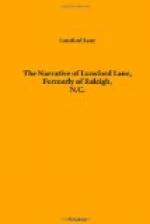P. Secretary to Gov. Dudley.
Raleigh, Nov. 20, 1840.
The foregoing petition was presented to the Senate. It was there referred to a committee. I knew when the committee was to report, and watched about the State House that I might receive the earliest news of the fate of my petition. I should have gone within the senate chamber, but no colored man has that permission. I do not know why, unless for fear, he may hear the name of Liberty. By and by a member came out, and as he passed me, said, “Well, Lunsford, they have laid you out; the nigger bill is killed.” I need not tell the reader that my feelings did not enter into the merriment of this honorable senator. To me, the fate of my petition was the last blow to my hopes. I had done all I could do, had said all I could say, laboring night and day, to obtain a favorable reception to my petition; but all in vain. Nothing appeared before me but I must leave the State, and leave my wife and my children never to see them more. My friends had also done all they could for me.
And why must I be banished? Ever after I entertained the first idea of being free, I had endeavored so to conduct myself as not to become obnoxious to the white inhabitants, knowing as I did their power, and their hostility to the colored people. The two points necessary in such a case I had kept constantly in mind. First, I had made no display of the little property or money I possessed, but in every way I wore as much as possible the aspect of poverty. Second, I had never appeared to be even so intelligent as I really was. This all colored people at the south, free and slaves, find it peculiarly necessary to their own comfort and safety to observe.
I should, perhaps, have mentioned that on the same day I received the notice to leave Raleigh, similar notices were presented to two other free colored people, who had been slaves; were trying to purchase their families; and were otherwise in a like situation to myself. And they took the same course I did to endeavor to remain a limited time. ISAAC HUNTER, who had a family with five children, was one; and WALLER FREEMAN, who had six children, was the other. Mr. Hunter’s petition went before mine; and a bill of some sort passed the Senate, which was so cut down in the Commons, as to allow him only twenty days to remain in the State. He has since, however, obtained the freedom of his family, who are living with him in Philadelphia.
Mr. Freeman’s petition received no better fate than mine. His family were the property of Judge BADGER, who was afterwards made a member of Mr. Harrison’s cabinet. When Mr. Badger removed to Washington, he took with him among other slaves this family; and Freeman removed also to that city. After this, when Mr. B. resigned his office, with the other members of the cabinet under President Tyler, he entered into some sort of contract with Freeman, to sell him this family, which he left at Washington, while he took the rest of his slaves back to Raleigh. Freeman is now endeavoring to raise money to make the purchase.




